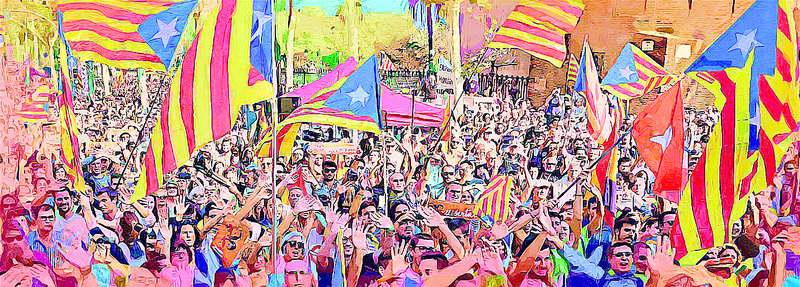THE CULTURAL TIGHTROPE
BARNEY GRIFFITHS
The victim card
As I’ve said before in this column, the best way to deal with bullies is to stand up to them and remain firm in your resolve...
As regular readers of this column will know by now, I’m in favour of Catalonia having a referendum on its future and also of it separating from Spain and becoming a republic. Admittedly, it’s not a particularly popular opinion among people who believe the last thing the world and Europe needs right now is another country claiming its independence amid a whirl of patriotic fervour and nationalism. And that includes many of my friends and family in the UK, especially on the back of a Brexit vote that divided the country. However, regular readers of this column will also know that I don’t believe Catalonia’s quest for independence is based on an exclusive nationalism but rather a need for Catalans to reclaim their identity and create a republic from the inclusive perspective of all being welcome.
Given what’s happened here in recent years it shouldn’t be difficult to understand why they feel this way: the rejection of their statute of autonomy has been followed by the suppression of Catalan identity in all areas, perhaps most harmfully in those of language and education, leading many Catalans to question what if anything they have in common with a country they are supposed to form part of but feel for the most part colonised by.
But this column is supposed to be about cultural differences, and what I want to address here is the way Catalans have gone about trying to win their independence. As many around the world now know, many Catalans feel victims of their situation, hence the notorious Òmnium Cultural video portraying an emotional Catalan actor begging Europe and the rest of the world to “Help Catalonia”. The mere fact that I originally wrote “breaking free from” Spain in the first sentence of this column before later changing it to “separating from” shows how this all-pervasive sentiment of victimisation affects those who defend the Catalan cause. And the video in question is a good example of what I’m referring to: although I agree with all of the sentiments expressed, and there can be no denying the facts of it - unless you are a member of the PP government, in which case denying the reality everyone else can see is seemingly an everyday part of your job - I don’t agree with the whole victim stance and the whining voice of the actor as she pleads with the world to help Catalonia out of the situation it finds itself in. To my mind, this weakens their cause.
The calm firmness displayed by President Puigdemont and his government in standing up to the inexcusable and cowardly bullying and threats of the Spanish government is precisely what the situation requires, rather than fleeing in the face of threats - shame on you Banc Sabadell and La Caixa - or playing the victim card to try and emotionally manipulate people into supporting your cause. As I’ve said before in this column, the best way to deal with bullies is to stand up to them and remain firm in your resolve, not whine about your situation to some perceived higher authority. I wish the Òmnium video, which is what much of the world will now view as the Catalan stance, had done more of the former and less of the latter.


